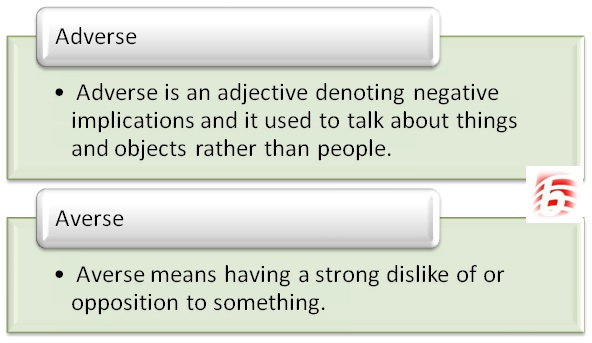Adverse vs Averse
Understanding the difference between adverse and averse is crucial as they may seem similar at first glance. In the English language, many words can be easily confused due to their similarities in spelling, pronunciation, or meaning. These differences can create confusion for non-native speakers of English. For such learners, grasping these subtle differences can be challenging. This article will primarily focus on the difference between the two words, adverse and averse. Both are adjectives with the same origin but denote negative implications. They have similar spellings, with the only difference being the ‘d’ in adverse, which is why many people confuse the two words.
What does Adverse mean?
According to the Oxford Dictionaries, adverse (pronounced ‘advəːs’) refers to preventing success or development; harmful; unfavorable. It is an adjective that denotes negative implications and is used to discuss things and objects rather than people. The word is often collocated with adverse weather conditions, adverse health conditions, adverse effects, adverse impacts, etc. Some examples include:
– The development will not have any adverse effect on bats or other wildlife living in the area.
– Despite the adverse blustery weather conditions, it was clear that Oxford had the edge.
Some synonyms for adverse include unfavorable, disadvantageous, inauspicious, unpropitious, unfortunate, unlucky, untimely, untoward, disagreeable, unpleasant, bad, poor, terrible, dreadful, dire, wretched, nasty, hostile, harmful, dangerous, injurious, detrimental, hurtful, deleterious, destructive, pernicious, disadvantageous, unfavorable, unfortunate, and unhealthy.
What does Averse mean?
The Oxford dictionary defines averse (pronounced /əˈvəːs/) as having a strong dislike of or opposition to something. Like adverse, averse denotes a negative implication. It is used in the context of someone being averse to something. Examples include:
– Strong and aggressive, he is not averse to a bit of shirt pulling and uses his arms effectively to hold off defenders.
– Now, some of you may know that if an opportunity arises for a little fun with a person of the opposite sex, I am not averse, rare as it is.
Synonyms of averse include opposed to, against, antipathetic to, hostile to, antagonistic to, unfavorably disposed to, ill-disposed to, resistant to, disinclined, unwilling, reluctant, and loath.
Key Takeaways
- Adverse and averse are linked in their origin but have different meanings. Adverse means harmful, unfavorable, or hostile, while averse means having a feeling of opposition, repugnance, and distaste.
- Adverse is used with conditions or things rather than with people, while averse describes a state of feeling of people.
- Adverse always precedes a noun (e.g., adverse effects, adverse weather), while averse is often used after the ‘be’ verb as part of the predicate of a sentence. Adverse is not followed by a preposition, but averse is followed by the preposition ‘to’.
